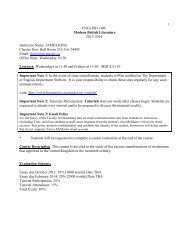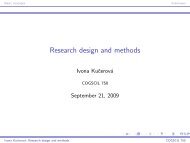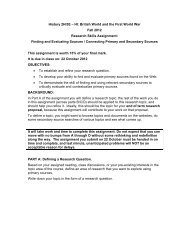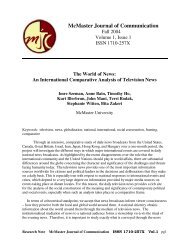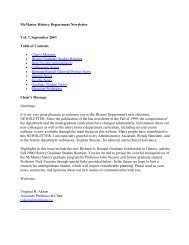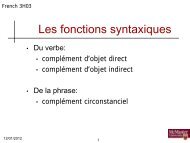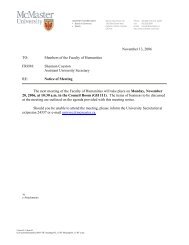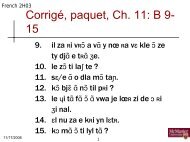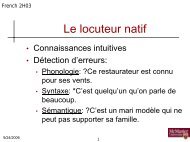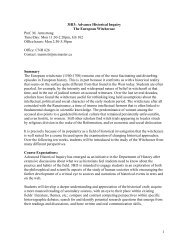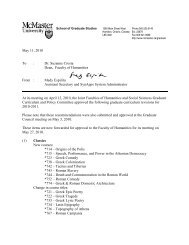The Syntax of Givenness Ivona Kucerová
The Syntax of Givenness Ivona Kucerová
The Syntax of Givenness Ivona Kucerová
You also want an ePaper? Increase the reach of your titles
YUMPU automatically turns print PDFs into web optimized ePapers that Google loves.
support in favor <strong>of</strong> the assumption that G-movement is dependent on head movement.<br />
1.4 <strong>The</strong> boundedness <strong>of</strong> G-movement<br />
In this section, I will explore the further predictions and consequences <strong>of</strong> restricting G-<br />
movement by head movement, namely, differences in locality restrictions on G-movement<br />
that depend on the movement properties <strong>of</strong> the relevant facilitating head.<br />
First <strong>of</strong> all, since head movement is clause bounded, we expect G-movement to be<br />
clause bounded as well. This is indeed correct. As we can see in the following examples,<br />
given elements can move only to the edge <strong>of</strong> their own embedded clause, even if the matrix<br />
clause introduces only new information.<br />
(37) For a long time I didn’t know what was going on with Mary.<br />
a. Ale pak mi bývalá spolužačka řekla, že Marie si vzala Petra.<br />
but then me former classmate told that Marie.Nom REFL took Petr.Acc<br />
‘But then a former classmate <strong>of</strong> mine told me that Marie got married to Petr.’<br />
b. Ale pak mi bývalá spolužačka řekla, že Marii potkalo velké<br />
but then me former classmate told that Marie.Acc met big<br />
štěstí.<br />
happiness<br />
‘But then a former classmate <strong>of</strong> mine told me that Marie got extremely lucky.<br />
(She won a lottery.)’<br />
c. #Marii mi bývalá spolužačka řekla, že potkalo velké štěstí.<br />
Marie.Acc me former classmate told that met big happiness<br />
In this respect G-movement differs from both wh-movement and contrastive focus movement,<br />
which are not clause bound, as can be seen in (38) and (39).<br />
(38) Koho, že jsi říkala, že si Marie<br />
whom.Acc that Aux-you said that REFL Marie.Nom<br />
‘Whom did you say Marie is going to Mary?’<br />
bude<br />
will<br />
brát?<br />
take<br />
(39) Pavla, jsem ti říkala, si bude brát Marie, ne Lucie.<br />
Pavel.Acc Aux-I you.Dat said REFL will take Marie.Nom not Lucie.Nom<br />
‘I’ve (already) told you that it is Pavel who is going to marry Marie not Lucie.’<br />
If G-movement were only restricted to clause boundaries, one might come up with another<br />
explanation. For example, one could argue that this follows from the fact that G-movement<br />
is A-movement (see appendix A for details)sec:AMovement. If this were the right explanation,<br />
we would not expect further locality restrictions. In contrast, if G-movement is<br />
restricted by head movement, we predict that G-movement is also not possible out <strong>of</strong> infinitival<br />
domains because the infinitive head cannot move out <strong>of</strong> the domain either. <strong>The</strong><br />
latter prediction is borne out, as can be seen in (40). <strong>The</strong> relevant verbal head is marked by<br />
a box.<br />
26



